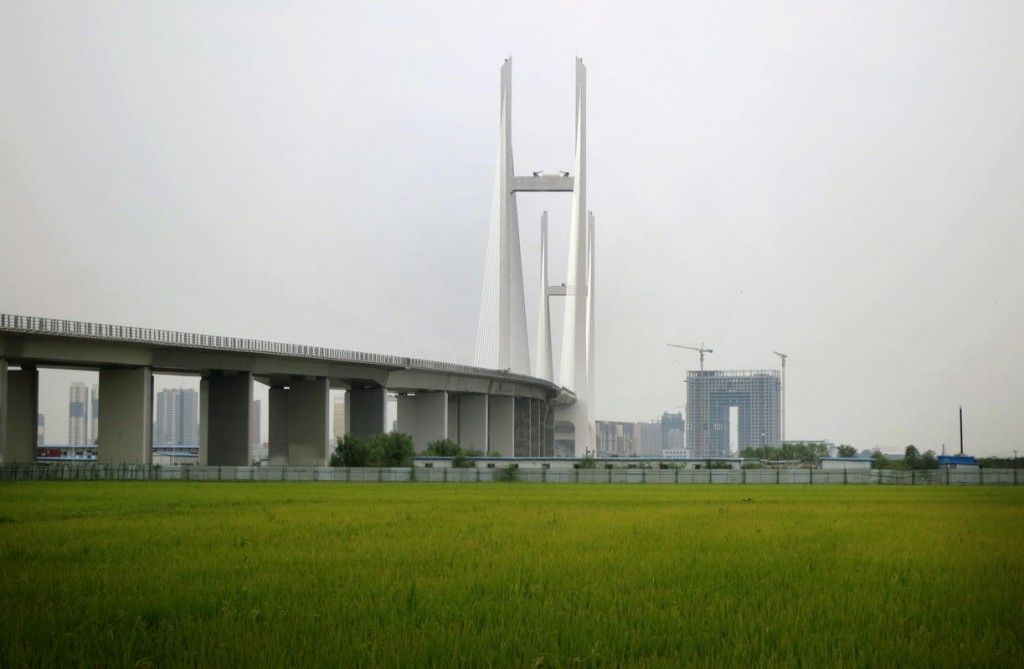A Half-Built Bridge to Nowhere
Very typical of maniacal and ingrate Kim Jong Un led North Korean behavior – enter an agreement saying they’ll meet obligations and then re-neg or in this case abandon outright. How many iterations have transpired over the six-party talks, on and off North-South Korean business activity in the South Korean operated economic zone, and so on. It’s no wonder the international community is fed up with Fatty Kim’s shenanigans.
The AP report below may hold some truth – dismayed with China’s objections over his nuclear intentions and all-round belligerence and China’s close relations with the South (China demurred on Kim’s repeated requests for an official visit; he also summarily executed his uncle who was considered pro-China), Kim’s cozying up to Russia in a bid to balance the relationship. Or maybe the North is just plainly out of hard cash (although barter is always an option). Most of North Korea’s economic aid comes from China which could really stick it to him (pressure on several fronts – trade, aid, energy, investment, diplomacy, etc.) if it wanted to.
But alas, China remains reluctant to exert any substantive pressure due in part to the strong pro-North lobby within the CPC and a deep-seated fear that should economic collapse really occur there, hundreds of thousands, if not millions, of refugees would spill over the border to become an immeasurable burden for the country. Not to mention, under that scenario, South Korean and American troops would be stationed right at the border and the CPC really doesn’t want to deal with that. Thus, despite venting some anger on the Global Times and other official media, China just puts up with Fatty Kim.
The bridge was supposed to be a key link for trade and travel between China’s northeast provinces and a much-touted special economic zone in North Korea — so key that Beijing sank more than $350 million into it. Now, it is beginning to look like Beijing has built a bridge to nowhere.
An Associated Press Television News crew in September saw nothing but a dirt ramp at the North Korean end of the bridge, surrounded by open fields. No immigration or customs buildings could be seen. Roads to the bridge had not been completed.
The much-awaited opening of the new bridge over the Yalu River came and passed on Oct. 30 with no sign the link would be ready for business anytime soon. That prompted an unusually sharp report in the Global Times quoting residents in the Chinese city of Dandong expressing anger over delays in what they had hoped would be an economic boom for their border city.
The report suggested the opening of the mammoth, 3-kilometer bridge has been postponed “indefinitely.” Beijing and Pyongyang have made no official comment.
Foreign analysts have suggested the apparent lack of progress might indicate wariness in Pyongyang over China’s economic influence in the country, which has been growing substantially in recent years as Pyongyang has become more isolated from other potential partners over its nuclear program, human rights record and other political issues.
Since its founding, North Korea has been exceedingly cautious of becoming too dependent on either of its superpower neighbors, China and Russia, preferring to play each off the other. That pattern seems to be repeating itself now.
The official media, while saying little about business with China, have lately been playing up the importance of improving trade and political ties with Moscow. On Monday, leader Kim Jong Un sent a powerful party cadre as his special envoy to Russia to discuss how to bolster such ties.
Better ties with Moscow could further dilute Beijing’s leverage over the North, the limits of which became apparent when the North went ahead with its first nuclear test in 2006. Beijing has repeatedly urged North Korea to abandon nuclear weapons, to no avail.
The bridge — which, from the start, appears to have been of more interest to China than to North Korea — is intended to provide a new connection between Dandong and the special economic development zone in North Korea’s Sinuiju. More broadly, China wants to develop inroads with North Korea that will allow its landlocked northeastern provinces access to North Korean ports so its goods can be exported or shipped down the Chinese coastline more cheaply. Hopes of attracting foreign investment to the 40-square-kilometer (15-square-mile) area of Sinuiju, much of which is still farmland, have yet to materialize.
Hajime Izumi, a North Korea specialist at Japan’s Shizuoka University, said the bridge delays come as Beijing and Pyongyang are rethinking their relationship, shifting from the past focus on alliance and mutual friendship to a more pragmatic one based instead on mutual interest. He added that North Korea may also simply be waiting for the Chinese to chip in more money.
– AP

